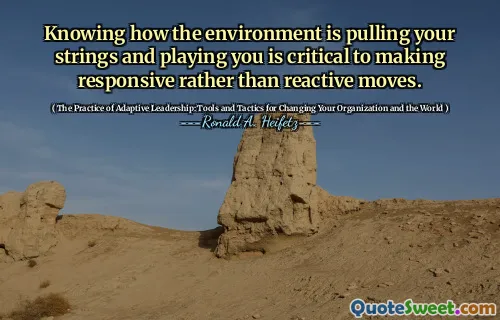
Knowing how the environment is pulling your strings and playing you is critical to making responsive rather than reactive moves.
Understanding the dynamics of one's environment is a fundamental aspect of effective leadership and decision-making. When we are aware of the subtle and overt forces acting upon us—whether they are organizational politics, cultural norms, market trends, or emotional biases—we are better equipped to navigate complex situations with intentionality. Recognizing these influences allows leaders to distinguish between reactions driven by external pressures and responses rooted in their core values and strategic goals. This awareness acts as a filter, preventing impulsive responses that may be maladaptive or counterproductive.
In the context of adaptive leadership, this insight encourages proactive engagement with challenges instead of merely reacting to crises as they arise. It fosters a mindset of observation, inquiry, and humility, prompting leaders to question their assumptions and consider the broader system at play. By doing so, they can craft more effective interventions, build resilience within their teams, and adapt strategies in real-time with greater confidence.
The analogy of being 'played' by the environment highlights that external forces often operate behind the scenes, subtly influencing perceptions and decisions. Recognizing these influences is akin to understanding the rules of a game—knowing the 'players,' the 'game board,' and the 'game's objectives' ensures one does not get manipulated or caught unprepared. Ultimately, the ability to discern these forces makes a leader more responsive rather than reactive, transforming challenges into opportunities for growth and positive change.
This concept resonates with the core tenets outlined by Ronald A. Heifetz, emphasizing the importance of systemic awareness and intentional action as keys to adaptive leadership and effective governance.






